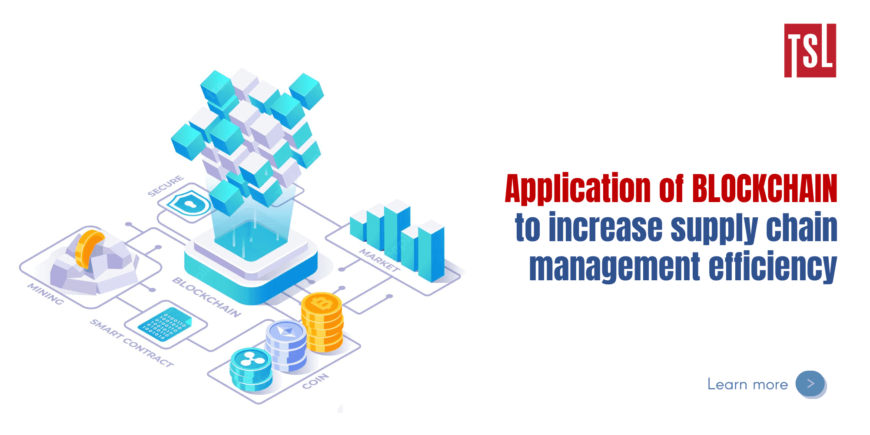Application of Blockchain to increase supply chain management efficiency
Over the past few years, blockchain technology has increasingly attracted the attention of various end-use industries. Blockchain is an internet-based technology that allows for the decentralized and immutable storage of huge amounts of structured data. Blockchain technology has the potential to increase the efficiency and profitability of most businesses and provide a platform for creating and distributing ledgers.
Encrypted ledgers and transactions make blockchain technology more secure than other models. Incorporating blockchain technology in the supply chain has the potential to significantly enhance the transparency and traceability of the supply chain while reducing costs. Since supply chain participants have their own copy of the blockchain, they can review transaction status, identify errors, and hold partners accountable for their actions. As a result, blockchain provides a complete, reliable, and tamper-proof audit trail of activities in the supply chain.
Blockchain supply chain can help users and companies track price, date, location, quality and other relevant information for efficient supply chain management. This increases the traceability of the raw material supply chain, reduces losses and costs incurred from counterfeit products, and improves visibility and compliance, thereby enhancing organization’s market.
As the popularity of blockchain technology continues to grow, large corporations and startups have begun to explore the use of the technology in many areas other than financial services. Blockchain-based innovation in the supply chain has the potential to dramatically drive business value by enhancing supply chain transparency, reducing risk, and streamlining overall supply chain management.
The integration of blockchain technology in the supply chain has helped to overcome three main supply chain problems: process optimization, data visibility and demand management. And this is has driven its adoption by various companies in the retail and supply chain sectors. According to the latest analysis by Emergen Research, the global blockchain supply chain is expected to reach $14,180 million by 2028, recording a strong revenue cagr of 63.9% during the forecast period.
5 ways that blockchain is redefining supply chains
Validation & Quality Assurance
Blockchain technology allows for efficient traceability of goods from a store to a specific producer or producer. The data is highly accurate and reliable because each product batch is equipped with a tag that effectively tracks the location of the goods and the interactions between supply chain participants.
Tracking goods in real-time
Blockchain technology creates a digital document in the cloud infrastructure that allows supply chain participants to accurately track the location of goods and products. More and more vehicles are being lost due to in-efficient tracking and loss of visibility of conventional systems, and blockchain can help overcome these limitations.
Increase freight and delivery
Functions such as invoicing, payment, and physical movement of goods can be made more cost-effective, easier to audit, and automated through smart contracts, where lines of computer code that uses data from the blockchain to verify when contractual obligations are met and when payments can be released. Distributed ledgers can reduce errors, shorten delivery times, and flag fraudulent activities.
Improve transparency
The low reliability of verifiable information due to lack of transparency is a major supply chain challenge as it can increase transportation and delivery costs. Each supply chain participant can check information for each vessel, container or cargo at any given time as all important data is stored on the blockchain. This also reduces discrepancies in documentation. Transparency also provides an opportunity to fine-tune the distribution process at a microscopic level that can significantly reduce fraudulent and inaccurate activities.
Automate payments
Transporting goods from one area to another creates a supply chain that involves many organizations and many interactions. These interactions mainly include payments and settlements which are complex and time consuming and can lead to manipulation, fraud, and errors. Blockchain can automate the invoicing and payment process and ensure accurate and timely calculations, eliminating the need for paperwork and ensuring compliance with transactions and speeding up the overall process.
Blockchain is a disruptive technology that streamlines the workflow of complex networks. In recent times, companies have rapidly adopted digital transformation and technology due to the increasing disruption in automation.
Conclusion
Current supply chains face many problems such as low traceability, complex compliance needs, low flexibility, and difficult stakeholder management. With Blockchain’s promise to create a more efficient, secure and open platform for e-commerce, the technology can safely and effectively solve these problems by providing auditability. , more immutable and non-intermediate.
*Source: smartindustry.vn







